C.R. Langille's Blog, page 16
October 29, 2015
Elk Hunting 2015
 Another elk hunting season come and gone with no meat to eat. Unlike the last two years, this time I didn't come home early due to bad weather or camper malfunctions, which was nice. In fact, the weather was almost too nice in my opinion. Though the mornings were cold and chilly (20's-30's), it warmed up to the mid-60's in the afternoon. I was hoping for a little bit of snow, but you know what they say, wish in one hand, shit in the other and see which one fills up first. It just wasn't meant to be.
Another elk hunting season come and gone with no meat to eat. Unlike the last two years, this time I didn't come home early due to bad weather or camper malfunctions, which was nice. In fact, the weather was almost too nice in my opinion. Though the mornings were cold and chilly (20's-30's), it warmed up to the mid-60's in the afternoon. I was hoping for a little bit of snow, but you know what they say, wish in one hand, shit in the other and see which one fills up first. It just wasn't meant to be.I was supposed to go with my dad; however, he came down with some sort of nasty virus the night before we were going to leave and had to back out. It was just me up there. On one hand, I was free to hunt when and how I desired. On the other, I exercise a little more caution when I go hunting by myself, so I didn't go on any long hikes or stray from my designated areas by much just in case something bad decided to happen.
I loaded up my rented A-liner. For one person, this thing was the perfect size, pulled like a champ, and kept me nice and toasty during the cold mountain nights. I could only imagine that it would have been a little bit tight with two people, and three people would have been a nightmare. I wish they made these things a bigger (as in big enough for a family of four), because I love how it folds down, but is still a hard-sided trailer.
 I arrived at my preferred camping spot with plenty of time to spare. After setting up camp, I headed off to my hunting area. It was the same place I killed an elk about three years ago. There are a lot of forest service roads and logging roads around it, which means increased traffic, but there is also a shit ton of elk sign in the area, plus up until this trip, I have always seen elk in this spot. I suppose this was going to be the year that things changed though. As I sat up in my little vantage point, I didn't see anything; however, about a 1/4 mile away, a shot rang out through the evening air. As the sun started to dip, I wanted to go check it out, so I hopped in the truck and went over that way. As I went up the parallel road, I saw a few hunting rigs with a freshly quartered elk. At least someone was successful.
I arrived at my preferred camping spot with plenty of time to spare. After setting up camp, I headed off to my hunting area. It was the same place I killed an elk about three years ago. There are a lot of forest service roads and logging roads around it, which means increased traffic, but there is also a shit ton of elk sign in the area, plus up until this trip, I have always seen elk in this spot. I suppose this was going to be the year that things changed though. As I sat up in my little vantage point, I didn't see anything; however, about a 1/4 mile away, a shot rang out through the evening air. As the sun started to dip, I wanted to go check it out, so I hopped in the truck and went over that way. As I went up the parallel road, I saw a few hunting rigs with a freshly quartered elk. At least someone was successful.The next morning I got up early, went back to my spot and decided to move into the trees a bit more. As I was hiking in, I found a wonderful area with tons of tracks and sign. I set up and started hitting my cow call hoping for the best. It wasn't 30 minutes later I hear an ATV coming up the logging road nearby. Much to my chagrin, said ATV stops and fires two shots at what I surmise was the bull elk I was calling in. What do you do? I would have done the same thing, but it was frustrating nonetheless. As the morning drags on, I still don't see anything, so I decide to pack it up and move on. That evening I went out to the area where the other hunters were successful. I wanted to see if I could find the kill site. I couldn't find it, but I did find this awesome open glade that looked promising, so I set up there for the evening. Again, nothing.
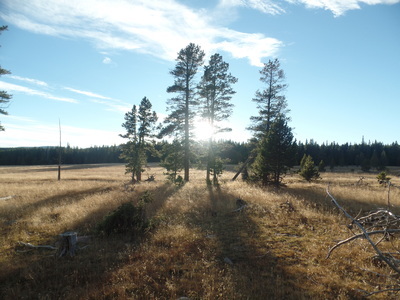
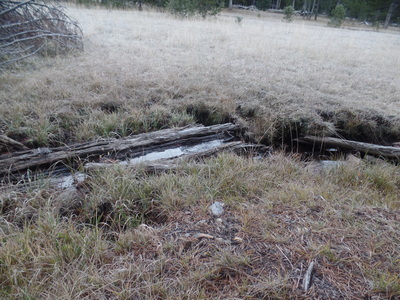
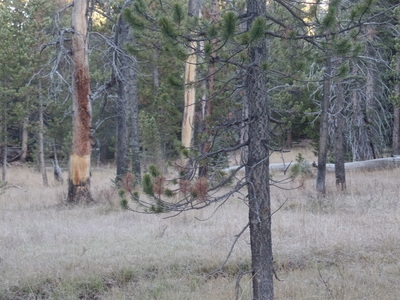
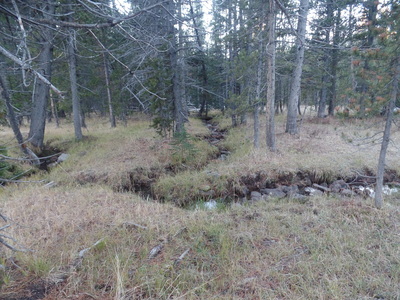 The next day I set up in that glade again, hoping to catch something on the move. There were a few shots off in the distance from other hunters, but nothing moving around me. Deciding that I needed to perhaps get away from the road even further, I decided to take a trail. I hiked up the trail about 1.5 miles and it was gorgeous. The hike itself wasn't too grueling seeing how the area I hunt is nearly at the top of the mountains anyway, so it was fairly flat. I found a spot that had lots of tracks and sign again and set up. As I hit my cow call, I heard something moving through the trees, but it never came out into the open. I did some more exploring that afternoon and found this kill site. I think this was a cow because the bones were very thick and large, but I couldn't find the head. I also found a neat-o tree stand someone had built in the pine trees. I tried this area a few more times during my hunt, but no luck.
The next day I set up in that glade again, hoping to catch something on the move. There were a few shots off in the distance from other hunters, but nothing moving around me. Deciding that I needed to perhaps get away from the road even further, I decided to take a trail. I hiked up the trail about 1.5 miles and it was gorgeous. The hike itself wasn't too grueling seeing how the area I hunt is nearly at the top of the mountains anyway, so it was fairly flat. I found a spot that had lots of tracks and sign again and set up. As I hit my cow call, I heard something moving through the trees, but it never came out into the open. I did some more exploring that afternoon and found this kill site. I think this was a cow because the bones were very thick and large, but I couldn't find the head. I also found a neat-o tree stand someone had built in the pine trees. I tried this area a few more times during my hunt, but no luck.
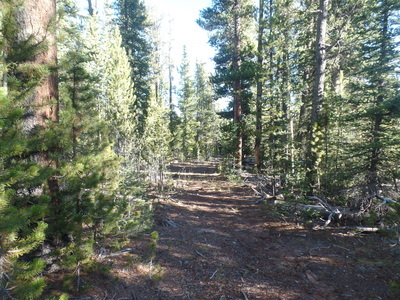
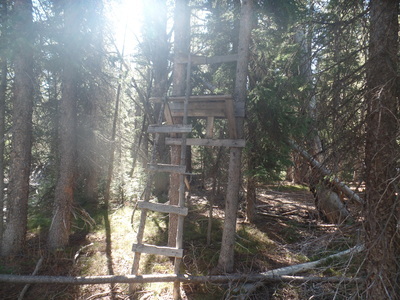
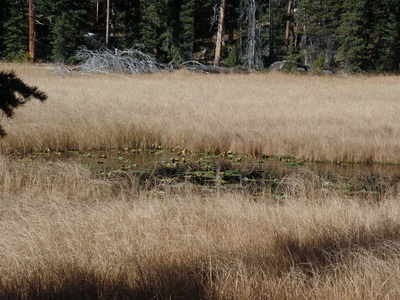
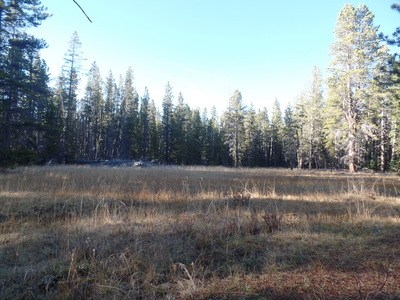 All in all, it was a bust as far as successful harvesting of an elk was concerned, but it was still a great trip. This area is one of my favorite patches of wilderness in Utah. More than likely I'll continue to hunt up there. Hopefully I'll be in the right place at the right time again. Regardless, it's awesome just to get out and be in nature.
All in all, it was a bust as far as successful harvesting of an elk was concerned, but it was still a great trip. This area is one of my favorite patches of wilderness in Utah. More than likely I'll continue to hunt up there. Hopefully I'll be in the right place at the right time again. Regardless, it's awesome just to get out and be in nature.
Published on October 29, 2015 10:00
August 31, 2015
Think of the Children! Extra Life...
 While I was at Gamercon last month, I came across a booth that was looking for people to help out with some charity fundraising. It sounded cool because basically you pledge to game on a certain day and look for people to help raise funds for children with bad diseases. Long story short, I decided to help out. If you want to learn more about the organization, click here. If you would like to support me in my efforts to support the sick children, click here. I'll have a page up on my website dedicated to the charity until the actual day of gaming which is Nov 7th I believe. Thank you!
While I was at Gamercon last month, I came across a booth that was looking for people to help out with some charity fundraising. It sounded cool because basically you pledge to game on a certain day and look for people to help raise funds for children with bad diseases. Long story short, I decided to help out. If you want to learn more about the organization, click here. If you would like to support me in my efforts to support the sick children, click here. I'll have a page up on my website dedicated to the charity until the actual day of gaming which is Nov 7th I believe. Thank you!
Published on August 31, 2015 10:58
July 22, 2015
Consequence Cover Art
 Here it is! The awesome cover art created by Syneca Featherstone. It's for my debut novel, Consequence. Here's a snippet about the book:
Here it is! The awesome cover art created by Syneca Featherstone. It's for my debut novel, Consequence. Here's a snippet about the book:Tobias Evard Warner II fights his way through a nightmare infested wilderness at the onslaught of the apocalypse in order to get back home to his family. He’ll sacrifice anything to ensure their safety, even if it means his own soul.
Dark Fantasy Press is publishing the novel. Check them out here:
http://www.darkfantasypress.com/
Published on July 22, 2015 18:00
July 3, 2015
2015 Scouting Adventures
 It's that time of year again. That time when hunting is just around the corner and it's time to put in the sweat equity. I went scouting yesterday. Even though I know the area, I needed to ensure that the deer were still there, and I also needed to start to make a game plan. My original plan, involved hiking up to the top (see the picture above) and setting up a trail camera to see what's moving. I got up there, and found a lot of sign that deer were moving around, but I couldn't find a good place to put my trial camera. So that spot is definitely on the list as a potential hunting spot, but I moved down a little lower.
It's that time of year again. That time when hunting is just around the corner and it's time to put in the sweat equity. I went scouting yesterday. Even though I know the area, I needed to ensure that the deer were still there, and I also needed to start to make a game plan. My original plan, involved hiking up to the top (see the picture above) and setting up a trail camera to see what's moving. I got up there, and found a lot of sign that deer were moving around, but I couldn't find a good place to put my trial camera. So that spot is definitely on the list as a potential hunting spot, but I moved down a little lower.Lower, I found a nice little meadow and actually spooked a buck out of his sleeping spot. I set my camera in that meadow. There were a couple of other places that hit my "might-be-a-place-to-hunt" radar, so I'll keep them in the back of my mind. I'll return in a few weeks to check on the camera, and possibly move it to another place.
I drew out of the archery hunt this year, so things a little different. Generally I black powder hunt, which means I need to get within 100-120 yards away. With the bow, I really want to be about 40 yards or less, especially since I'm new at archery hunting. The last thing I want to do is injure the animal and not kill it right away. I've already told myself that I won't take a shot unless it's within a comfortable range and the deer is positioned right.
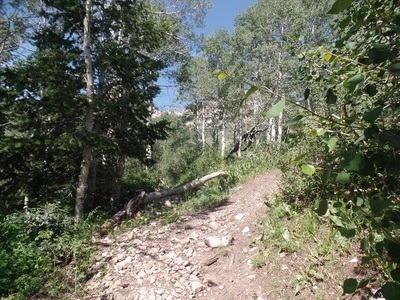
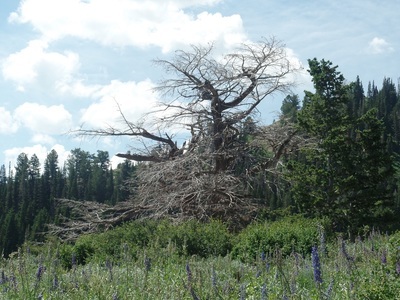
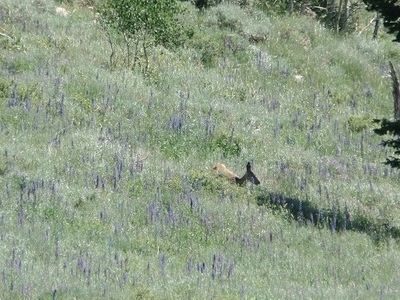
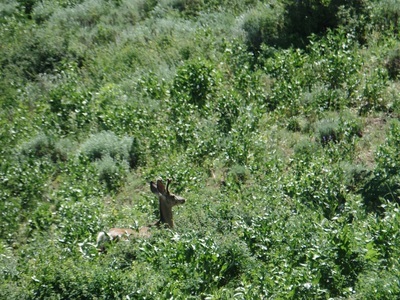
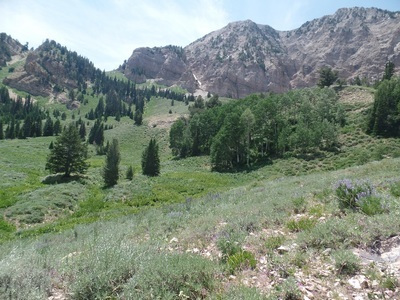
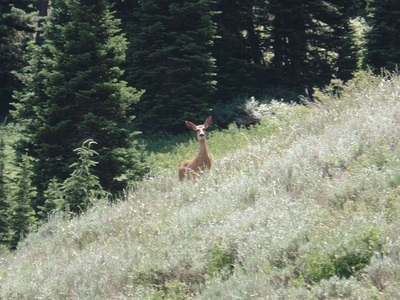
Published on July 03, 2015 10:43
June 2, 2015
Survival Training
 If you follow my blog or have read any of my earlier posts on survival training, you’ve probably heard me talk about training. Training in the skills you need to know is essential, because when the shit hits the fan is definitely not the time to try and become the master of wilderness survival. Get out there and practice in a safe environment when your life isn’t on the line. Get some professional hands-on training from skilled professionals.
If you follow my blog or have read any of my earlier posts on survival training, you’ve probably heard me talk about training. Training in the skills you need to know is essential, because when the shit hits the fan is definitely not the time to try and become the master of wilderness survival. Get out there and practice in a safe environment when your life isn’t on the line. Get some professional hands-on training from skilled professionals.I decided to put my money where my mouth is and get some professional training. I was trained by the military to survive in the wilderness, but that was over 14 years ago. I most certainly have lost some skills, and I know I’m weak on primitive fire-making and medicinal herbs. Therefore, when I saw that holistic survival professional, Luke McLaughlin was putting on a weekend class in Utah, I jumped on the chance to attend.
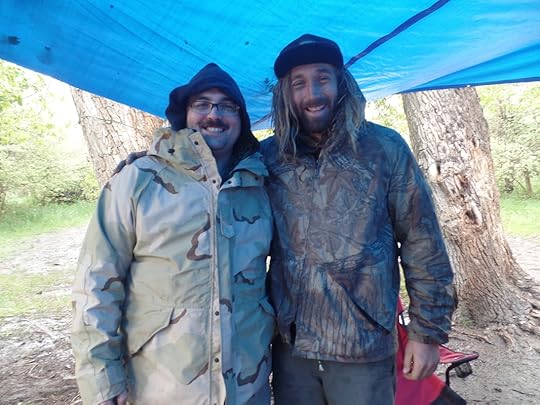 Luke McLaughlin was on the television show, Naked and Afraid where he had to survive 21 days in the wild with nothing but his skills, a partner, and one survival item. His episode landed him in the country of Namibia located in southwest Africa. His emphasis isn’t just on survival, but re-wilding and the survival of the earth. You can learn more about him here at his website: http://www.holisticsurvivalschool.com
Luke McLaughlin was on the television show, Naked and Afraid where he had to survive 21 days in the wild with nothing but his skills, a partner, and one survival item. His episode landed him in the country of Namibia located in southwest Africa. His emphasis isn’t just on survival, but re-wilding and the survival of the earth. You can learn more about him here at his website: http://www.holisticsurvivalschool.com The training was supposed to take place over a weekend in the West Desert of Utah. I knew it wasn’t going to be an arduous ordeal where we’d be surviving on nothing; rather it was an educational opportunity to meet some new people, get back in touch with nature, and learn some primitive survival skills. Luke would be touching on two of the items I really wanted to learn more about (fire-making skills and herbal/edible plants), so I was stoked.
To set the scene, it had been raining off and on for the last two weeks leading up to the training. The weather forecast called for a medium chance of showers, and cooler temperatures and they weren’t joking. We got out to the site and started to set-up, and it rained off and on the entire day. The temperature dropped to the 40’s and we found ourselves sitting by the fire and socializing for the majority of the first night.
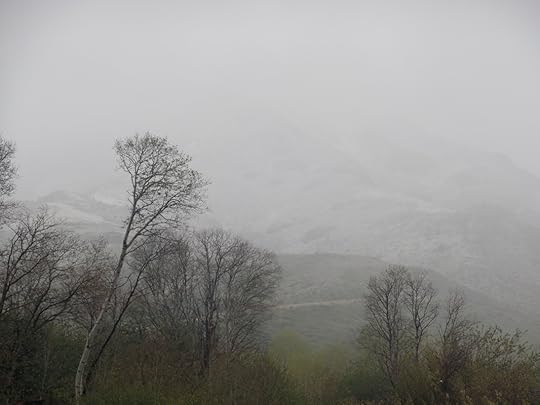 Snow dropped on us and the temperature dropped even further during the night, making for a restless sleep. I had packed for chill and rain, but obviously not for the kind of cold snap that occurred. The next day, it was sprinkling off and on, and we started talking about plants. Instead of just diving right into different plants that could be found in and around the mountainous areas of Utah, Luke broke it down into what kind of plants could be used medicinally based upon the type of issue occurring with your skin/body, and the taste/smell of the plant. It was almost a basic usage that would work the majority of the time and was great because you might not know what kind of plant it is, but based on some characteristics, you can surmise what it can do to help you. I would suggest attending his training for that knowledge alone.
Snow dropped on us and the temperature dropped even further during the night, making for a restless sleep. I had packed for chill and rain, but obviously not for the kind of cold snap that occurred. The next day, it was sprinkling off and on, and we started talking about plants. Instead of just diving right into different plants that could be found in and around the mountainous areas of Utah, Luke broke it down into what kind of plants could be used medicinally based upon the type of issue occurring with your skin/body, and the taste/smell of the plant. It was almost a basic usage that would work the majority of the time and was great because you might not know what kind of plant it is, but based on some characteristics, you can surmise what it can do to help you. I would suggest attending his training for that knowledge alone.It was shortly after that block that the rain started to pour down on us. We broke for lunch to see what would happen, but it was apparent that it didn’t have any intention of stopping any time soon. We had a couple folks in the group who were scheduled to fly out the next morning, and we didn’t want to get stuck up in the mountains and have them miss their flight. The road to get up to the site was narrow and muddy, and the rain was just making it worse. We finally decided to call it quits and reschedule for another time. Oddly enough, we made it down the mountain fine, but the car I was in got stuck in the mud on a dirt road near a field. We got out, but it took a lot of persistence and mud baths.
 The reschedule day was very nice with it being sunny and cool enough to be comfortable. This is when we went hard into primitive fire-making skills. Luke taught us some different wood combinations that work well together, and some to avoid. He broke down the steps and theory behind making a “nest” to put the coal into, as well as how to properly hand drill and bow drill. First things first, as Luke said at the class, DO NOT RELY ON PRIMITIVE METHODS to start a fire. They should be used as a last resort. That’s why it’s imperative that you have a couple different methods of making a fire with you. Everything has to be just right when using a primitive method. The materials and weather were ideal, and it took me 1.5 hours to get a fire going with a bow drill. Granted, it was my second attempt in my lifetime to try and do this (the first attempt was an utter failure) and there were a lot of hiccups and training moments. However, it was very elating to get that fire going finally. From now on, whenever I go camping, I’ll be practicing to try and get better.
The reschedule day was very nice with it being sunny and cool enough to be comfortable. This is when we went hard into primitive fire-making skills. Luke taught us some different wood combinations that work well together, and some to avoid. He broke down the steps and theory behind making a “nest” to put the coal into, as well as how to properly hand drill and bow drill. First things first, as Luke said at the class, DO NOT RELY ON PRIMITIVE METHODS to start a fire. They should be used as a last resort. That’s why it’s imperative that you have a couple different methods of making a fire with you. Everything has to be just right when using a primitive method. The materials and weather were ideal, and it took me 1.5 hours to get a fire going with a bow drill. Granted, it was my second attempt in my lifetime to try and do this (the first attempt was an utter failure) and there were a lot of hiccups and training moments. However, it was very elating to get that fire going finally. From now on, whenever I go camping, I’ll be practicing to try and get better. 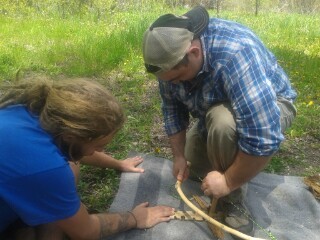
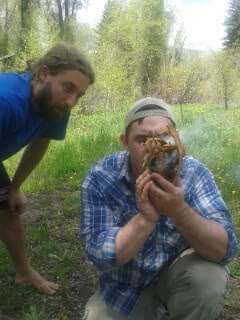 We finished up with more herbals and reinforced some of the knowledge that was taught on the first day. All in all, it was great training and I would recommend taking a class from Luke if you get a chance. He has a laid back teaching method, but is still very thorough. It’s obvious he knows what he’s talking about because he’s had to rely on his skill in real-life situations. Plus, he’s just an all-around cool guy with some fun stories. If you see him, asking what the bonus C stands for in his C’s of survival, probably one of my favorite and something I’ll take with me camping/hunting from now on.
We finished up with more herbals and reinforced some of the knowledge that was taught on the first day. All in all, it was great training and I would recommend taking a class from Luke if you get a chance. He has a laid back teaching method, but is still very thorough. It’s obvious he knows what he’s talking about because he’s had to rely on his skill in real-life situations. Plus, he’s just an all-around cool guy with some fun stories. If you see him, asking what the bonus C stands for in his C’s of survival, probably one of my favorite and something I’ll take with me camping/hunting from now on.
Published on June 02, 2015 11:21
May 6, 2015
Guns! Guns! Guns!
There was a recent thread on Facebook in a group run by Seton Hill University college friends where some questions about firearms recently came up. Before that thread ever posted, I was already playing around with the idea of doing a multi-post series on guns and writing. I've done a blog post before on guns, but it was geared more toward self-defense rather than writing. My intent with this series would be to give authors a basic course on firearms, their operation, use, and other information based around the senses with the hopes that it would help said authors create realistic scenes involving firearms. Nothing beats hands on training, but this might help in a pinch. However, this is a larger endeavor, so before I start into this project I would like to know if this is something you'd like? I would run a blog post on each of the following: revolvers, semi-automatic pistols, shotguns, bolt action rifles, and semi-automatic rifles. Each post would involve some basic terminology, common calibers and what they mean, different uses for each type of weapon, and perhaps even a video of said weapon's operation (maybe even fire it at something as well). What do you think? Vote below please.
Published on May 06, 2015 18:33
April 20, 2015
Hunting: Why I Hunt
 By most accounts, you could say that I fail at hunting. In all my time hunting creatures, I've only killed two deer, one elk, and a handful of pheasant. I just returned from turkey hunting for the second year in a row and still haven't produced a turkey. Hell, even on a lesser level, I haven't been able to catch a fish for the last three times I've been out fishing. One might ask, why do you keep hunting then? Why continue to pour money into something that produces little results? Furthermore, even when you are successful, it costs even more money to have that animal processed and packaged. So, why hunt?
By most accounts, you could say that I fail at hunting. In all my time hunting creatures, I've only killed two deer, one elk, and a handful of pheasant. I just returned from turkey hunting for the second year in a row and still haven't produced a turkey. Hell, even on a lesser level, I haven't been able to catch a fish for the last three times I've been out fishing. One might ask, why do you keep hunting then? Why continue to pour money into something that produces little results? Furthermore, even when you are successful, it costs even more money to have that animal processed and packaged. So, why hunt?I hunt for several reasons. First and foremost, I hunt because I enjoy hunting. I love being in the outdoors, in wild places, in the mountains, in the woods, by creeks, rivers and lakes. The fresh air and the cool breeze is enough to put a smile on my face. There are a lot of people who take the outdoors for granted, especially in this day and age. They would rather sit on their couch, point their nose towards a computer screen (ironic that I'm on a computer at this moment typing, lol) and never leave the comfort of home/the city. That's fine. If that's what makes you happy, then embrace it and find all the enjoyment you can. I find enjoyment being out in the wilderness.
The second reason I hunt, is because it is a great time to bond with family and friends. It's pretty rare that I strike out to go hunting alone. Generally I'm with someone and it is a wonderful time to talk, tell jokes, and just hang out and have a good time. Sitting around the campfire late at night shooting the shit, or even hiking around the wilds on your way to the next hunting spot. You're there together, sharing an experience and making memories that will last a lifetime.
I would love to be "successful" each time I go out and harvest my intended game animal. However, I know it isn't going to happen all the time. My advice, don't let it get you down. My family used to have a scale for success. First, just going out was a success. Second, seeing animals was a bigger success. Finally, actually harvesting the animal was the ultimate success. This recent hunt was pretty successful in those terms. We went out, saw turkeys, hell, we even struck up a couple of conversations with turkeys using my box call. However, we didn't harvest one. Still a success.
It would be easy to let things like not harvesting an animal get you down. My advice to you, figure out why you are hunting and enjoy making memories.
Published on April 20, 2015 09:06
March 13, 2015
How Much Horror?
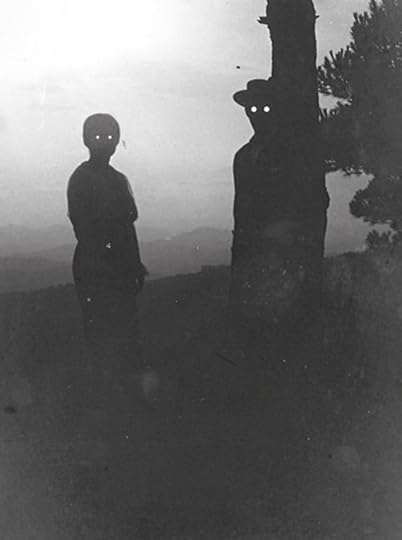 I recently had the pleasure of sitting on a panel at the Life, the Universe, & Everything Symposium. The panel was entitled: "So You Want to Write Horror?" One of the questions was, how much horror should you put in your writing? It was a question that begged a specific answer, but needed to be answered in a fortune-cookie-eqsue manner. So, how much horror should you put in your writing: as much as the piece calls for.
I recently had the pleasure of sitting on a panel at the Life, the Universe, & Everything Symposium. The panel was entitled: "So You Want to Write Horror?" One of the questions was, how much horror should you put in your writing? It was a question that begged a specific answer, but needed to be answered in a fortune-cookie-eqsue manner. So, how much horror should you put in your writing: as much as the piece calls for.You might be thinking, thanks oh wise one, your answer is about as valuable as a punch to the throat. Let me elaborate before you gasp for air and tear up from my, oh so wise wisdom. Horror covers such a broad swathe with everything from psychological to shock and gore. How much horror, and what type of horror to insert into your story depends on what kind of audience you are writing for. Are you writing visceral, gory, and debauched horror in the same vein of Edward Lee, or are you writing a slow, creeping psychological horror more reminiscent of Edgar Allan Poe? Whatever you are writing, and whomever you are writing for, the story is going to dictate how much is too much, and what's just right.
If you have submitted to different publishers who specialize in the horror genre, you have probably seen the following statement in the submission guidelines; no gore for gore's sake. There's a reason for this, and it's because readers and editors can spot that poor attempt for cheap shock a mile away. Gore has its place in fiction. For example, if I'm writing a book about zombies, I know that there is an expectation for gore. Zombies are gross, they eat the living, and you just need to throw in some juicy bits (pun intended). However, if I'm writing a slow, creeping horror, it doesn't make sense to have a dude in a hockey mask slashing up teenagers who are having sex in a tent every other scene. Your horror has to match your story in the same fashion. Unfortunately, there is no quadratic formula out there to calculate this, and it will change from story to story. I'm going to dip in the vague, mystical pot of advice again and say that it is a feeling that has to match the flow the story. Take the Goldilocks approach and put in the amount that is "just right."
How do you figure out this secret of finding what is just right, and knowing how a good story should flow? You could either go on a lifelong quest of tracking down the Illuminati and raiding their secret, underground library to find the dark spell that would grant you the knowledge, or you could simply read books in the genre. Regardless of what genre you write, you need to read other authors of that genre. Read what came before, read what's happening now. You need to know what is selling, what has sold, what are some of the common tropes of the genre. It will help give you a feel for what some of that great literature looks like, and as well as some examples of bad writing. Don't worry, it's all research and it will all help in the long run.
One of the panelists brought up the point that horror is about fear, and I couldn't agree more. H.P. Lovecraft said, "The oldest and strongest emotion of mankind is fear, and the oldest and strongest kind of fear is fear of the unknown." Deep down, if you are writing horror, you are trying to tap into that fear of the unknown and present in such a way that it entertains (or at least disturbs) your readers. This is both easy and difficult at the same time (I know, I know, even more worthless Zen-like wisdom). Everyone is different and everyone is afraid of different things. Things that don't necessarily scare me, might immobilize someone else with fear. What does this mean? It means that while you won't scare everyone, you will scare some folks.
To make things easy and fun, (because, let's face it, writing should be fun, otherwise why do it) just write what you find scary and/or enjoyable. If you get caught up in the web of trying to please others, the tentacled god of the industry will drag you down into a dark abyss from which you might not be able to crawl out. Have fun.
Published on March 13, 2015 12:10
February 16, 2015
The Reality of Fighting for Writers
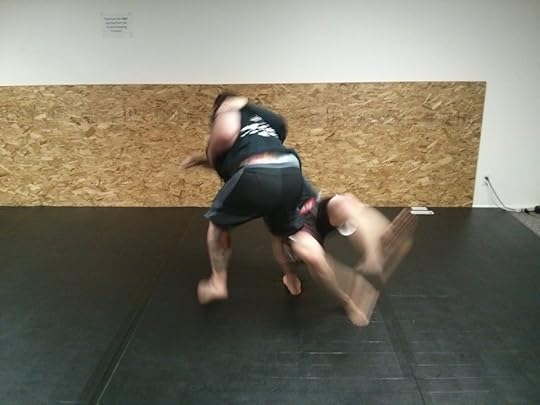 If Hollywood has taught us anything about fighting, it's that you can fight for hours, take tons of damage, or do amazing acrobatic feats with gravity defying flying kicks. While admittedly, that makes for great visual action, it is a fairly unrealistic portrayal of how fighting actually works (unless you're some sort of superhuman). I want to break it down for authors who strive to create realistic fight scenes and avoid the Hollywood cliches.
If Hollywood has taught us anything about fighting, it's that you can fight for hours, take tons of damage, or do amazing acrobatic feats with gravity defying flying kicks. While admittedly, that makes for great visual action, it is a fairly unrealistic portrayal of how fighting actually works (unless you're some sort of superhuman). I want to break it down for authors who strive to create realistic fight scenes and avoid the Hollywood cliches. You might be asking yourself, well, C.R. Langille, who are you and what makes you an expert? Great question. While I may not be an "expert" perse, I've practiced different fighting arts for over 17 years. I was a Wing Chun Kung Fu practitioner for over 9 years, I've been grappling for 2 1/2 years, I was a member of the Society for Creative Anachronism and fought in what they called heavy combat for a over 6 years. In other words, I'm familiar with what it feels like to don a full suit of armor and fight folks at combat speed and strength, both in single combat and in group settings. Does it make me an expert, no, but I know my way around a fight and I know what it takes to fight.
The first thing I want to touch on, is the gas tank. Not for your car, but for your body. It takes an incredible amount of energy to fight, both physically and mentally. There are factors to consider that you can control, and others that you can't. For example, breathing is probably one of the most important factors of a fight. If you don't continue to breathe, you run out of energy quicker. Sounds easy, right? Wrong. I have seen amazing athletes gas out because of breathing when they fight, where as I've seen somewhat out of shape folks continue forward. Why is this? It's because the art of breathing while fighting takes practice. It's something that early on you have to make a conscious effort to do until it is just second nature. The key, is relaxation. Sounds counter-intuitive, but the more relaxed your fighter is, the longer they will maintain gas in the tank. Don't believe me? Shadow box for one minute straight. Really focus on breathing, staying loose. You know you're there if you can keep up a conversation. Then, give yourself a bit to cool down and try it again, but go ahead and tense up when you throw your strikes. If you did it right, then you'll see the difference. You might ask, but if I'm relaxed, my strikes won't hit with power. Wrong again. It's hard to explain how or why this works, but if you watch highly skilled fighters compete, it almost looks effortless. You can hit faster, harder, and save more energy when you relax. This doesn't mean that you can go on forever, but you will be able to fight on longer.
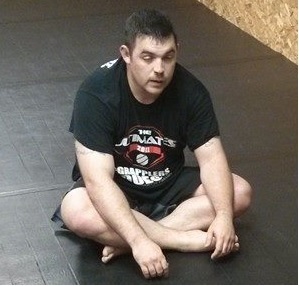 This is after a couple of rounds of grappling. I get tired just looking at the picture sometimes. So what does that all mean for writing about fight scenes? If you want to add some realism, keep all of the above in mind. Is your protagonist someone who has never fought before? If so, keep the above in mind. How long are they going to be able to fight before they can't breathe anymore? Granted, most fights don't last very long, but your fighter might not last more than a minute if they are tense and hold their breath. Want to know what it feels like? Go for a run, and try not to breathe while you're at it. When you run out of gas, your mind starts to cry out for you to stop, and the simplest of actions become labor intensive. Your mind will trick you into giving up sooner and you start to listen. If they are practiced, then show that in your writing. In the first major fight, have them think about staying relaxed, or how they kept their breathing in check.
This is after a couple of rounds of grappling. I get tired just looking at the picture sometimes. So what does that all mean for writing about fight scenes? If you want to add some realism, keep all of the above in mind. Is your protagonist someone who has never fought before? If so, keep the above in mind. How long are they going to be able to fight before they can't breathe anymore? Granted, most fights don't last very long, but your fighter might not last more than a minute if they are tense and hold their breath. Want to know what it feels like? Go for a run, and try not to breathe while you're at it. When you run out of gas, your mind starts to cry out for you to stop, and the simplest of actions become labor intensive. Your mind will trick you into giving up sooner and you start to listen. If they are practiced, then show that in your writing. In the first major fight, have them think about staying relaxed, or how they kept their breathing in check. Breathing and relaxation are all things that you can control, albeit with practice. There are factors that are going to be out of your control during a fight, things like adrenaline dump. Have you ever watched a professional fight, and near the end of the first round, or in the second round one of the fighters just seems to lose the energy to do anything? More than likely this is adrenaline dump. When the body knows something crazy is about to happen, it dumps a bunch of adrenaline through your system, basically your body dumps a ton of adrenaline into your system in a response to the upcoming battle. However, if the battle lasts more than a minute or so, then that adrenaline can sometimes lose its desired effect and leave you exhausted. I’m sure there is a better, medical explanation for this, but that’s the C.R. Langille diagnosis in a nutshell.
So what does this mean for your writing? This factors into larger battles more than anything. Your protagonist might be ramping up mentally before the battle, so much so that the body will dump adrenaline too soon. This means that soon after the battle begins, your main character will have an adrenaline dump and lose energy.
Another point, is fighting in armor. Armor restricts your mobility while offering protection. Armor is heavy. Even lighter armor is going to wear on the body after awhile, especially if your character is wearing it all day long. It takes an amount of physical conditioning to wear that throughout the day and not have negative side effects later on. If your character is wearing a helmet, it might restrict visibility or dampen hearing ability. Finally, it's hot. So there is a hydration issue, as well as the threat of heat stroke depending on the locale. Hell, depending on the locale there is the issue of freezing to death. Think about it, you get into a heated battle in the snowy wastes and win the day; however, you worked up a big sweat. Next thing you know, your cold and shivering, and then you're sleeping the long sleep.
 Armor from my SCA days. So what does this mean for your writing? Don't have your protagonist in full plate armor doing acrobatics. They also shouldn't be able to have full peripheral vision if they are wearing a full faced helmet. Take into consideration the stresses of wearing armor all day, or what the environment is doing to your character in that armor. I think sometimes we forget the details and just go with it; however, if you add that level of realism into your writing, it will get the reader thinking about it.
Armor from my SCA days. So what does this mean for your writing? Don't have your protagonist in full plate armor doing acrobatics. They also shouldn't be able to have full peripheral vision if they are wearing a full faced helmet. Take into consideration the stresses of wearing armor all day, or what the environment is doing to your character in that armor. I think sometimes we forget the details and just go with it; however, if you add that level of realism into your writing, it will get the reader thinking about it. 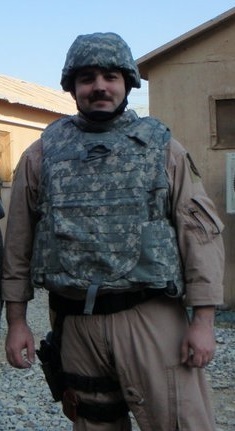 Modern armor: just as uncomfortable. Finally, let's talk about getting hurt. When you fight, you get hurt. You are going to feel it the next day. Muscles get strained, bruises may appear, or there could be things internally that start happening. The body can take a lot of punishment before it shuts down, but that doesn't mean we don't feel that punishment. You may or may not feel things during the fight. I don't know how many times I've grappled, sparred, or whatnot and woke up the next day feeling like a dump truck hit me. It gets worse with age, but it happens at every level. My jaw was sore whenever I ate food or talked for three days after taking a couple hits to the face during a sparring session: the other guy was even wearing boxing gloves. I've had my elbows click and be sore for months after getting armbarred during grappling. While fighting in armor for the SCA, I took a shot to the leg with a "sword" that left a bruise that didn't go away for two weeks, and that was with the armor on.
Modern armor: just as uncomfortable. Finally, let's talk about getting hurt. When you fight, you get hurt. You are going to feel it the next day. Muscles get strained, bruises may appear, or there could be things internally that start happening. The body can take a lot of punishment before it shuts down, but that doesn't mean we don't feel that punishment. You may or may not feel things during the fight. I don't know how many times I've grappled, sparred, or whatnot and woke up the next day feeling like a dump truck hit me. It gets worse with age, but it happens at every level. My jaw was sore whenever I ate food or talked for three days after taking a couple hits to the face during a sparring session: the other guy was even wearing boxing gloves. I've had my elbows click and be sore for months after getting armbarred during grappling. While fighting in armor for the SCA, I took a shot to the leg with a "sword" that left a bruise that didn't go away for two weeks, and that was with the armor on. Bottom line, if your characters end up fighting, just take a moment later to talk about how their body held up. Did they get injured? Well then don't forget about that later on when you have them trying to spring up a mountainside. Keep it fun, keep the action going and don't bog the narrative down with details, but keep it real as well. Your readers will appreciate it. Now go write.
Published on February 16, 2015 09:25
January 22, 2015
Panels!
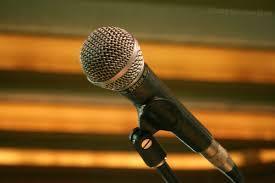 Well guess who's going to be a panelist...this guy. That's right; hide your sanity, leave your common sense at home, and bring some sort of recording device, because I'm going to be sitting on some panels (and not nice wooden ones).
Well guess who's going to be a panelist...this guy. That's right; hide your sanity, leave your common sense at home, and bring some sort of recording device, because I'm going to be sitting on some panels (and not nice wooden ones).This year I'll be attending the Life, the Universe, & Everything Symposium in Provo, Utah. While there, I'll be on the panel for "So You Want to Write Horror?" on Friday, Feb 13 (fitting, right?), as well as the panel for "The Magic of Minis" on Saturday, Feb 14 (hopefully it's about the use of miniature figurines in role-playing games and not the magic of mini candy bars. Because, let's face it... mini candy bars are not magical). So if you are going to the symposium, come stop by and learn some mystical knowledge (or at least be entertained for an hour or two).
Published on January 22, 2015 18:28



